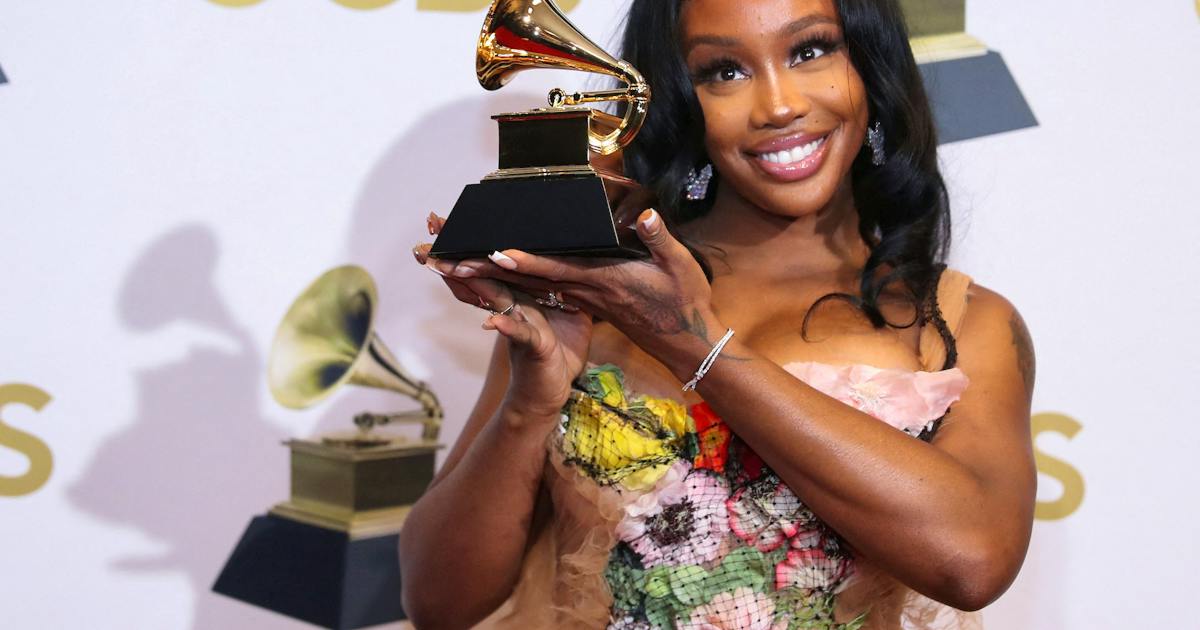By Lisa Richwine
LOS ANGELES (Reuters) – Women are poised to pile up the gold at the Grammy awards on Sunday, reflecting a rise in female representation on pop music charts and record-setting performances at stadium concerts and cinemas.
Taylor Swift, SZA and songs from the Oscar-nominated “Barbie” movie lead the competition for the music industry’s highest honors. Jon Batiste is the only man among eight nominees for album of the year, the top Grammy prize.
SZA, the female singer of revenge fantasy “Kill Bill,” will head into the ceremony as the most-nominated artist with nine nominations.
The strong showing coincided with a year of milestones for women in entertainment and gains in the predominantly male music business.
Swift’s Eras Tour broke ticket sales records, eclipsing Elton John’s, at the same time Beyonce played to packed stadiums. “Barbie” created a pink-fueled phenomenon at cinemas, where Swift’s concert film also became a blockbuster.
“Women had a phenomenal year, not just in music, but in ‘Barbie’ being the biggest-grossing movie,” said Billboard awards editor Paul Grein. “Women dominated pop culture.”
In addition to Swift and SZA, the other women vying for this year’s album prize are Miley Cyrus, Lana Del Rey, Olivia Rodrigo, Janelle Monae and boygenius, the band featuring indie rock musicians Julien Baker, Phoebe Bridgers, and Lucy Dacus.
It is just the 12th time in the Grammys’ 66-year history, Grein said, that women received the majority of nominations for album of the year.
In other categories, hits from the “Barbie” movie landed 12 Grammy nominations, including a song of the year nod for Billie Eilish’s ballad “What Was I Made For?”
RECORDING ACADEMY RECRUITS WOMEN
Changing demographics in the Recording Academy, the group of musicians, producers, engineers and others who vote on the Grammy nominees and winners, likely prompted a shift. Since 2019, the percentage of female members has risen to 30% from 26%.
“They have been aggressively recruiting new members, especially members of color and women,” Grein said. “They are infusing the membership with a lot of members who will probably see things differently.”
Some of the male competition was between albums. Harry Styles, Bad Bunny and other past Grammy winners did not release new music during the eligibility period of October 2022 through Sept. 15, 2023.
Still, the percentage of women artists on the Billboard Hot 100 at the end of 2023 reached 35%, a 12-year high, according to a study by the USC Annenberg Inclusion Initiative and professor Stacy L. Smith.
Women also made gains behind the scenes, with women of color driving the first increase in female songwriting credits in 12 years. Nearly 20% of songwriters were women, up from 14% a year earlier.
While far from reaching parity, female musicians made significant progress in just a few years, Smith said.
“When you look at the data, you see that the collective action across the music industry is moving toward women,” she said. “That we haven’t seen before.”
The realm of producers ticked up but remained predominantly male. In 2023, women received 6.5% of producer credits. No women were nominated for the Grammy for producer of the year.
Women also saw less success in Grammy categories for rock, dance and hip-hop, said Tatiana Cirisano, senior music industry analyst for MIDiA Research.
“What we have here is a year in which several female superstars had extraordinary hits,” Cirisano said. “Yet overall, gender imbalances have not shifted as much as we would hope.”
On Sunday, several women could make history at the Grammys.
Swift would be the first artist to win album of the year four times if she claims the trophy for “Midnights.”
If SZA prevails with “SOS,” she would be the first Black woman to win album of the year as a lead artist since Lauryn Hill received the honor 25 years ago.
Winners will be announced at a ceremony broadcast live from downtown Los Angeles on CBS and streamed on Paramount+.
(Reporting by Lisa Richwine; Editing by Mary Milliken and Aurora Ellis)





